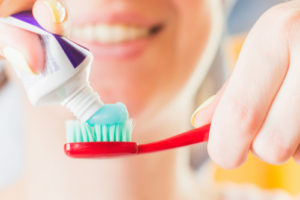Dental Benefits of Fluoride Toothpastes and Treatments

In this day and age of information, trends spread like wildfire. The platforms of social media and blogs allow rapid mass sharing of information and misinformation alike.
There are some health topics that even licensed healthcare professionals disagree on. It is frustrating for patients seeking information to find differing opinions among their doctors. Even more frustrating is the appearance of countless “experts” giving their opinions online. It is difficult to know whom you should listen to and whom you should ignore.
Recently, a patient shared with us that he had begun using a fluoride-free toothpaste. When asked why, he replied, “I don’t know. I read in a blog that fluoride was bad!” For this particular patient, who has an extremely high risk for cavities, fluoride is essential in preventing dental disease and the need for expensive and extensive dental work. He made a decision without having all of the information.
This blog seeks to give you the important information you need to make good decisions about your dental health.
What is Fluoride?
Fluoride is a naturally occurring mineral. It is present in the ground, and therefore the ground water in various levels throughout the earth. Some places have very high levels of fluoride in the soil, and others have none. Much of what we know about fluoride results from studying the differences in the health of people raised in these areas.
Is Fluoride Dangerous?
Actually, it can be.
There are some harmful health consequences of too much fluoride. Basically, an “overdose” of fluoride can create a state of toxicity. This can be chronic, as in people raised in areas where the naturally occurring fluoride is extremely high in concentration. It can also be acute, as when a small child eats an entire tube of prescription-strength fluoride gel.
Do you know why you should not eat a polar bear? No, it’s not because they are super cute (although that is a good reason). It is because a polar bear’s diet consists strictly of fish that are high in vitamin A. The amount of vitamin A stored in a polar bear’s liver is enough to kill a human!
But vitamin A is good for you in the right amounts. It is essential for good vision, development of teeth and bones, and maintenance of a healthy immune system. Doctors agree that vitamin A is necessary for good health!
This is all to explain that the same mineral that can be good for you in small amounts can be toxic at extremely high amounts. Such is the case with fluoride.
In the correct amounts, fluoride is not only safe; it is essential to good dental health!
How Can I Make Sure I’m Getting the Right Amount of Fluoride?
Fluoride is the subject of countless scientific research studies, and many of them aim to determine the correct amount of fluoride for the dental health benefits.
The answer to this question is that each person may need a different amount of fluoride to have optimal dental health. Patients with a very low risk for cavities (i.e. have never ever had a cavity) probably do not need any supplemental fluoride. They will get all the fluoride their teeth need by brushing twice daily with a fluoride toothpaste.
Other people with a high cavity risk, dry mouth, or exposed tooth roots may require professional fluoride treatments every three months!
The need for fluoride is determined by the individual patient’s needs. This is why consistent dental visits with Dr. Ann, Dr. Lauren, Phyllis, and Nancy are so important. These women are experts at evaluating dental risk, including any changes in that risk over time.
Why is Fluoride Important for Good Teeth?
Fluoride, in the correct amounts, has been scientifically proven to improve dental health in multiple ways. Listed below are several of the important ways fluoride benefits the teeth.
- Stronger enamel – Fluoride makes enamel stronger by causing it to absorb more minerals like calcium and phosphate. It also becomes part of the complex structure of your enamel. When fluoride incorporates itself into your natural enamel, the result is a harder, stronger enamel.
- More resistant to cavities – This harder, stronger enamel is able to fight tooth decay. The surface of the enamel is more difficult for bacteria to penetrate. If bacteria cannot get past your enamel, they cannot cause a cavity!
- More resistant to acid erosion – In previous blogs, we have talked a lot about acid and how bad it is for your teeth. Acid is the reason sugar-free drinks, like diet soda and sparkling water, can cause cavities. Acid also causes enamel to become thinner, which makes the teeth look yellower! Fluoride makes your enamel more resistant to damage from acid.
- Less sensitivity – Many of our patients suffer from extremely sensitive teeth. They cringe at the idea of a professional teeth cleaning because of the cold air and water the dental hygienists use. Did you know fluoride fights sensitivity? Patients who have a consistent professional fluoride application have noticeably less sensitivity. Anything that helps you stay on track with consistent dental visits will lead to better dental health.
- Protection of exposed roots – Did you know that the roots of your teeth do not have enamel? Enamel is the hardest substance in the human body. It coats and protects our hard-working teeth. When gums recede, the roots of teeth are exposed. Roots do not have this protective coating of enamel. They are softer and more likely to get cavities. This makes the protection of fluoride very important for people with gum recession!
Do You Have More Questions about Fluoride Not Answered Here?
Call today to schedule a consultation with Dr. Ann, Dr. Lauren, or our hygienists Phyllis and Nancy. They can evaluate your specific risk for the problems listed above and help you determine how fluoride can best help you with great dental health.
